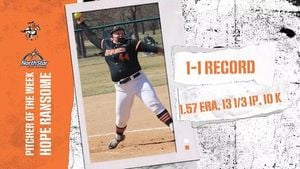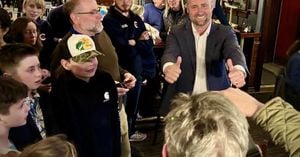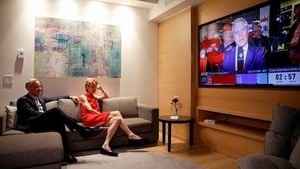As South Korea approaches the 2025 presidential election, speculation around Han Duck-soo's candidacy is intensifying, particularly with the emergence of the 'anti-Lee Jae-myung Big Tent' movement. Former Prime Minister Lee Nak-yeon has hinted at a possible alignment with this coalition, indicating a significant shift in the political landscape.
On April 29, 2025, during a State Council meeting, Han Duck-soo, the current Prime Minister and acting President, exercised his veto power against the Constitutional Court Act amendment, a move that has been interpreted as a strategic maneuver ahead of a potential presidential run. Han refrained from making direct comments about his political ambitions, yet the resignation of key aides, including his secretary Son Young-taek, signals that preparations for a campaign are well underway.
Jeong Dae-cheol, head of the Heonjeong Association, revealed that he had spoken with Lee Nak-yeon, who expressed a willingness to support the Big Tent initiative if it aligns with his political goals. Jeong stated, "Lee Nak-yeon indicated he would gladly assist if a coalition is formed outside the traditional party structure, hinting at a broader political strategy aimed at crisis management and political reform." This statement underscores the growing interest among political figures in uniting against the ruling Democratic Party's candidate, Lee Jae-myung, who has been a dominant force in the election landscape.
Lee Nak-yeon has faced criticism for his potential participation in the Big Tent, with some members of the Democratic Party accusing him of betrayal. Jin Seong-joon, the chairman of the Democratic Party's Policy Committee, remarked, "Engaging with a government that has been accused of insurrection is a direct betrayal of the public's trust." This reflects the tensions within the Democratic Party as it grapples with its identity and strategy in the face of mounting political challenges.
Han's recent actions, including his veto of the Constitutional Court Act amendment, which he argued undermines the President's appointment powers and violates the Constitution, have further fueled speculation about his intentions. During the State Council meeting, he emphasized the importance of constitutional integrity, stating, "The amendment attempts to restrict the powers of the acting President and contradicts the spirit of the Constitution, which clearly defines the term of Constitutional Court judges as six years." This statement not only highlights his constitutional concerns but also positions him as a defender of presidential authority.
Moreover, Han has been active in economic discussions, recently participating in a high-level trade meeting with U.S. officials in Washington, D.C. He noted that significant uncertainties in trade negotiations had been resolved, and he called for prompt action on a supplementary budget proposal amounting to 12 trillion won, urging the National Assembly to expedite its processing. Han stated, "The effectiveness of the supplementary budget relies on speed; it is crucial that we utilize the taxpayers' money effectively."
As the political landscape shifts, Han's potential candidacy is viewed with mixed feelings. Some analysts believe that his long tenure in public service, coupled with a focus on economic recovery and national unity, could resonate with voters. However, challenges remain, particularly regarding his association with the previous administration led by President Yoon Seok-yeol, whose controversial decisions have left a mark on his political reputation.
Political insiders speculate that Han may officially announce his candidacy shortly after the People Power Party's third preliminary election, which will conclude on May 11, 2025. This timeline aligns with the legal deadline for public officials to resign in order to run for office, set for May 4, 2025. If Han does resign, it is anticipated that he will deliver a message emphasizing national crisis recovery and unity, framing his candidacy as a necessary step for the country's future.
In the backdrop of these developments, the People Power Party is also navigating its own internal dynamics as it conducts preliminary elections to select its candidates. The second round of voting is scheduled for April 29, 2025, with a voter turnout of 51%, which some analysts view as a sign of renewed political engagement among the party's base.
Kim Sang-il, a political commentator, noted that the voter turnout is relatively strong given the context of the party's recent challenges, including the fallout from Yoon Seok-yeol's impeachment. He remarked, "Despite the controversies surrounding the previous administration, over half of the party's supporters are still participating in the electoral process, indicating a level of political interest that is encouraging."
As the competition heats up, candidates like Kim Moon-soo and Han Dong-hoon are emerging as frontrunners, each representing distinct factions within the party. Kim is seen as a strong candidate among pro-Yoon supporters, while Han Dong-hoon appeals to those critical of the former president's legacy. This division reflects broader tensions within the party as it seeks to redefine its identity moving forward.
Meanwhile, Hong Joon-pyo's recent comments about potentially retiring from politics if he does not make it to the final candidate list have drawn attention. Political analysts interpret this as a significant gamble, illustrating the high stakes involved in the current electoral climate. Choi Jin-nyuk, a legal expert, commented, "Hong's declaration is a bet on his political future; if he fails to secure a place in the final two, it could mark the end of his political career."
As the political landscape continues to evolve, the potential for a 'Big Tent' coalition, along with Han Duck-soo's anticipated candidacy, sets the stage for a highly competitive election season. The outcome of these developments will undoubtedly shape South Korea's political future and influence the direction of the country's governance in the years to come.
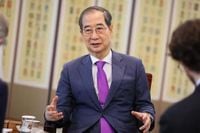
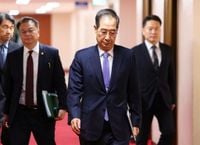
![[시사정각] 국민의힘 2차 경선 발표...한덕수와 '슈퍼 빅텐트' 가능할까?](https://thumbor.evrimagaci.org/qrBU8LoBP7FiQqzoxQqa0YCPfuc=/200x0/tpg%2Fsources%2F650b24ab-6c3a-4064-b289-487b5035eb01.jpeg)

